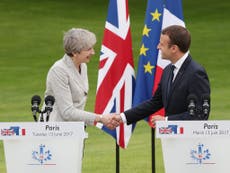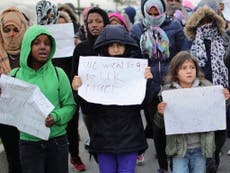There’s no one better than Macron when it comes to smooth diplomacy – but even he can’t predict our post-Brexit relationship with France
If there is one truism more misleading than the idea that France and the UK could not be more different, it is that, deep down and in power terms, we are essentially the same

The Royal Military Academy at Sandhurst was the venue for this week’s UK-French summit meeting, and you can see why. It offered just the right blend of ceremony and substance for a President as sensitive to both as Emmanuel Macron. As a military establishment outside London, it also provided security sufficient for an occasion that brought together not only the two leaders, and their retinues, but – for the first time – also their intelligence chiefs.
The military setting, however, betrayed something else. When the UK and France can find nothing else to talk about – or, perhaps more important, nothing particular to agree on – the UK-France defence and security relationship is wheeled out as evidence to the contrary. We have shared interests, it is said. Thus an offer of UK Chinooks to help out the French in the Sahel complements a supply of French warplanes to adorn the otherwise empty runways of our new aircraft carrier.
Anything else? Well, we both talk a good talk about combating terrorism (talk that has not always been matched by action, at least on the UK side, as those who remember the long-delayed extradition of Rachid Ramda might attest). And military and defence officials on both sides will insist that the relationship is a great deal more significant than sceptics allow. But it is hard not to observe that defence and security tend to buttress the Entente Cordiale when everything else starts to look a little thin.
For if there is one truism more misleading than the idea that France and the UK could not be more different, it is that, deep down and in power terms, we are essentially the same. It is true – to a degree – that we share the same global scale of thinking, the same post-imperial hang-ups, the same status as permanent members of the United Nations Security Council, the same military capability as nuclear powers. But even if we stay with geopolitics – without straying into food, drink, logical thinking, Roman law and revolution – then one mighty obstacle to this common mind set looms, and that is Europe.
Which brings us back to Sandhurst and the diktat of defence and security cooperation, because there is a real possibility that, with Brexit, even this area of joint UK-French interest becomes more complicated.
In retrospect, the UK’s Brexit vote had two unheralded consequences. The first was that, against pretty much all forecasts, solidarity among the other 27 EU members increased, and the EU, as an institution became more, and not less, popular. Rather than encouraging more departures, the Brexit vote – so far – seems to have had the opposite effect.
The second was that the EU almost instantaneously revived a plan for closer defence cooperation – up to and including a common army, which the UK had consistently opposed. So hostile was the UK to such a project – on the grounds that it risked undermining Nato – that, even after the Brexit vote, the then Defence Secretary, Sir Michael Fallon, insisted that the UK would use its veto to prevent it. Nonetheless, plans for much closer EU defence cooperation, if not an actual EU army, are proceeding.
Both these unforeseen consequences were then reinforced by a further surprise: the election of Macron as President of France – and not only his election by a landslide, but the fact that he had campaigned on an enthusiastically pro-EU and pro-Europe platform. His youthful energy and his zest for his new job seemed to give a fresh sense of purpose to the whole European project at a time when Brexit could have threatened it.
Macron was also in place just in time – potentially – to take over the reins of European leadership. Angela Merkel’s poor showing in the German election left her not only politically weakened, but preoccupied – for four months now – with constructing a new coalition. In so far as anyone has been designated her successor as Europe’s guardian, it is Macron, who within a week of the German election set out his own vision for a reformed European Union in an authoritative speech at the Sorbonne.
Like so much of what Macron has said since taking office, it suggested he had thought long and hard both about what he was aiming for and how to achieve it. Nor has he neglected Brexit. He envisages that the UK, as the strongest European power militarily (jointly with France), could – and should – retain its European defence role. He has also held out the prospect of an EU reformed in such a way – two speeds, perhaps – that just might draw the UK back.
All of which is refreshing and injects a new optimism in the EU. But it will not necessarily help the UK to fit back in, even in the defence arena – the choice of Sandhurst for this week’s summit notwithstanding. It is understandable that France would want defence co-operation with the UK to continue after Brexit; however debilitated the UK’s troop strength might seem to its top brass, it remains, with France, the strongest force in Europe. The UK, for its part, has insisted that Brexit will have no bearing on defence co-operation, as it is leaving the EU; it is not leaving Nato.
But this could become more difficult. If the EU develops a credible defence arm and if post-Brexit UK becomes more Atlanticist in defence terms – after all, our nuclear capability is more dependent on the US than many like to think – then a stark choice between Nato and an EU defence association may await. It is the same choice that Nato membership and a special defence relations with France have allowed the UK to postpone for more than half a century. But the time for such fudging may be running out.
No wonder the intelligence chiefs were on hand. No wonder the UK and France patched up their differences just enough over Calais; no wonder they offered small goodwill tokens, such as Chinooks for the Sahel and a French contribution to the UK force in Estonia; no wonder there was ceremony in the form of honour guards and fly-pasts.
But Emmanuel Macron knows well the value of diplomatic distraction. He deployed it himself when he hosted Vladimir Putin at Versailles and then Donald Trump at the Bastille Day parade. His proposal to loan us the Bayeux Tapestry was just as deftly judged. Nonetheless, a time will come when the UK will finally have to make its defence choice and, for all his persuasive powers, the French President will not have even a casting vote.





Join our commenting forum
Join thought-provoking conversations, follow other Independent readers and see their replies